Fifty Milestones
Written for Hanoi Grapevine by Paul Zetter, musician, composer, filmmaker and music reviewer
Photos by Khuất Tuấn Anh
Kindly credit Hanoi Grapevine when sharing the article.
Please do not copy or repost without permission
Nguyễn Bảo Long’s epic journey into recorded jazz reaches its halfway point.
One year ago on the edge of Hanoi’s bustling Old Quarter, amidst the winding streets and historic architecture, saxophonist Nguyễn Bảo Long and his team opened Long Waits. They call it ‘a modest jazz club,’ and it has become a haven dedicated to the art of jazz.
As a native of Hanoi whose passion for jazz was ignited in the early days of the Vietnamese jazz scene, Bảo Long has fulfilled the first part of his dream: to create a space where jazz can flourish as a cultural force, an artistic expression, and a bridge between tradition and modernity.
The creation of Long Waits was influenced by the atmosphere, cultural outlook and ambience of Bảo Long’s long time friend Nguyễn Quí Đức (*) and his Tadioto salon in Hanoi. Đức himself stood on the new stage at Long Waits and formally opened the club for Bảo Long. It was as if he was passing the mantle to Long. With Đức’s untimely passing last year, Long has taken up the mantle with a passion and vigour of his own while conceiving of an ontaking that is proving historic and epic in nature – the second part of his dream.
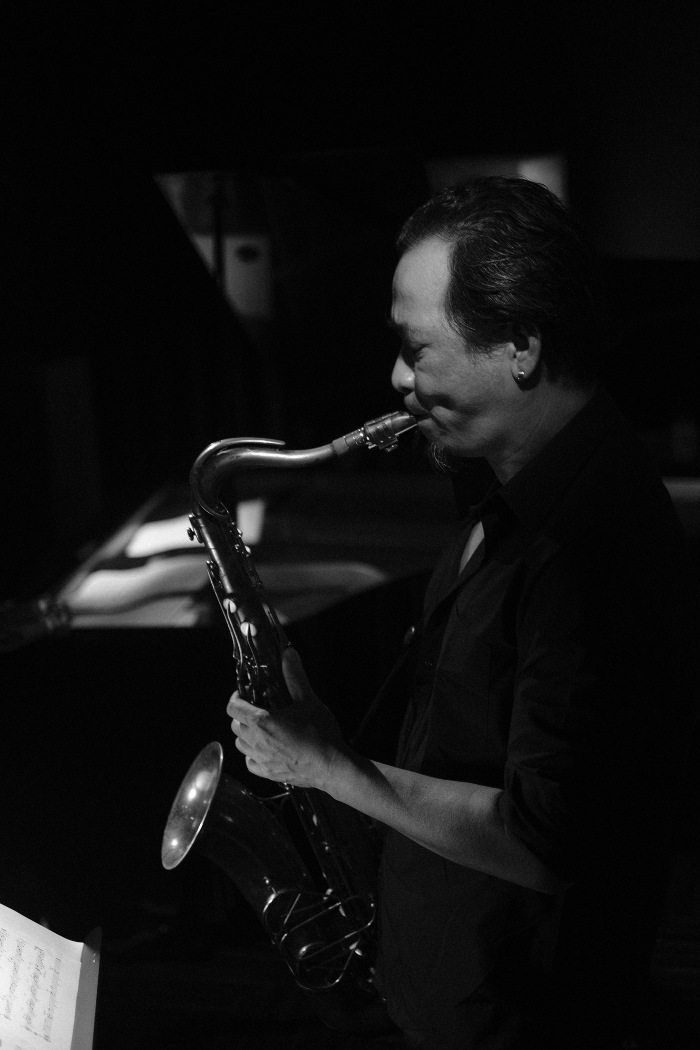
Central to Bảo Long’s vision for Long Waits is his ambitious project to perform a hundred classic jazz albums live with his band (one a week) over the span of two years. This odyssey through jazz’s iconic records is not merely a musical endeavour; it is a cultural exploration, a celebration of musical diversity, and a testament to the enduring influence of jazz on global culture. Each album serves as a milestone in jazz history—from the pioneering innovations of Miles Davis and John Coltrane to the soulful melodies of Billie Holiday and the avant-garde experiments of Ornette Coleman.
The twelve inch LP format, which revolutionised the music industry in 1948, played a pivotal role in shaping jazz’s evolution and its capacity to convey complex, musical narratives and emotions. The twenty minutes of music each side could contain completely transformed the existing mass market of 78s, which could only contain one song on each side. As well as opening up long form classical music to the consumer, artists from Frank Sinatra, Duke Ellington and Miles Davis began conceiving of forty minutes of music split into two halves as a way of deepening their craft and storytelling. The 1950s and 1960s became pivotal decades for jazz, witnessing the creation of numerous landmark albums that significantly influenced the genre’s evolution and beyond. These albums not only reflected the creative innovations of their times but also set standards for future generations of musicians. Albums such as Kind of Blue, A Love Supreme, The Shape of Jazz To Come, Mingus Ah Um, Maiden Voyage, Time Out, Bitches Brew, and many more – all blueprints for the future of jazz and are all on the list at Long Waits.
By meticulously recreating these albums live each week at Long Waits (with the intermission coming at the end of ‘side one’), Bảo Long and his quartet of musicians are immersing audiences in the depth and richness of jazz, inviting them to experience firsthand the innovative spirit and compositional brilliance that defined the genre’s golden vinyl age.
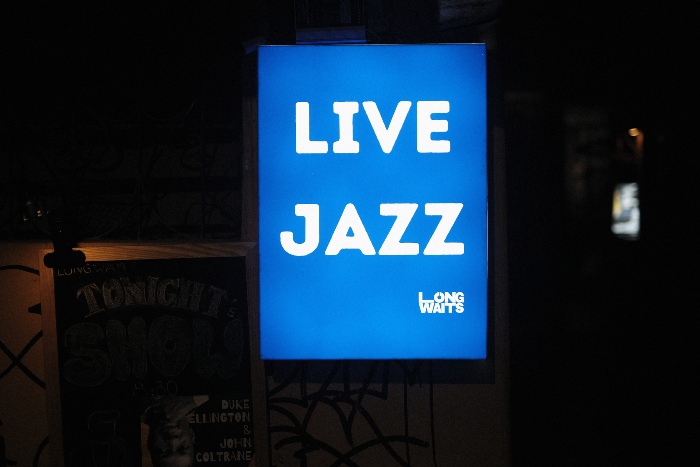
In Vietnam, where jazz was once a niche interest confined to a small circle of enthusiasts, Bảo Long’s project has come at a time of a jazz renaissance. The Jazz Department at the Vietnam Conservatory of Music now has an excellent performance-driven curriculum that is producing excellent young jazz musicians. Years of international cultural exchange have helped artists from other countries wake up to the jazz talent and musical heritage in Vietnam and finally, jazz clubs have sprung up showcasing local jazz talent – like Long Waits.
Through Bảo Long’s dedication to performing classic jazz albums, he is introducing Vietnamese audiences and musicians to the genre’s profound emotional depth, creativity and cultural significance. Each performance at Long Waits becomes a gateway to exploration, offering listeners an opportunity to connect with the universal themes and diverse influences that permeate jazz’s rich tapestry – a tapestry woven by the yarn of classic jazz albums. Taking part in this journey have been some of Hanoi’s most promising up-and-coming young musicians such as pianists Thế Anh and Việt Tú, drummers Tú Thịnh and Đức Anh amongst others.
Beyond the confines of dedicated venues like Long Waits, many jazz musicians can find themselves navigating commercial pressures that can stifle creativity and limit artistic exploration. The phenomenon of playing in unchallenging environments, where the repertoire often defaults to familiar and crowd-pleasing tunes from the jazz songbook, the Real Book, poses a significant challenge, not just in Vietnam. This standardised collection of lead sheets provides a convenient repertoire of jazz standards and greatest jazz hits but can inadvertently foster a reliance on formulaic approaches and inhibit musicians’ improvisational creativity. I know because I’ve lived and played jazz in that world – jazz has always walked this tightrope between the familiar and the cutting edge.
For many jazz musicians, the Real Book serves as a reliable resource for gigs in mainstream venues and corporate events where audiences expect the familiar ‘sound’ of jazz. While these settings provide opportunities for exposure and financial stability, the pressure to please crowds and maintain commercial viability can discourage risk-taking and experimentation amongst the new generation of jazz musicians. This in turns can lead to a homogenization of styles and a reluctance to venture into less familiar or challenging musical territories.
In contrast, a venue like Long Waits, led by a visionary like Bảo Long, offers musicians a welcome counterpoint to the commercial pressures facing jazz. By prioritising artistic integrity and cultural enrichment over profit margins, Bảo Long is creating an environment where musicians push the boundaries of their craft, explore unconventional compositions, and engage in improvisation over changes which might be in turn unfamiliar and surprising. It’s like attending 100 jazz history lessons at jazz school.
Through his mentorship of young musicians, Bảo Long has been fostering this culture of artistic courage and exploration. By choosing classic albums he challenges aspiring talents to move beyond the confines of the Real Book and delve deeply into jazz’s vast repertoire to find their own inspiration.
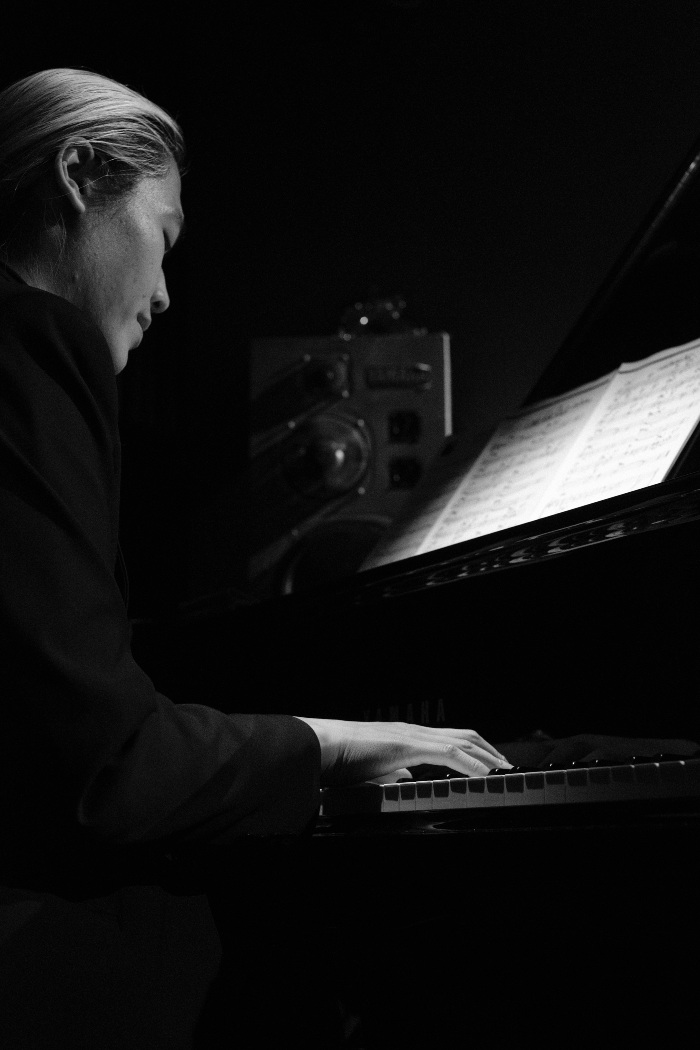
At Long Waits, the emphasis on weekly live performances that capture the spontaneity and improvisational spirit of jazz, reminds audiences that at its core, jazz is about personal expression and collective storytelling. Each week every Friday and Saturday Bảo Long and his band play one album. Each of these evenings becomes an opportunity for cultural appreciation and artistic dialogue, as musicians and audiences alike come together to celebrate the universal language of jazz.
In a world where jazz music is often commodified and packaged for mass consumption as a nostalgic lifestyle and fashion decision, Bảo Long’s commitment to preserving jazz’s essence serves as a beacon of artistic integrity. He reminds us that jazz is more than a genre; it is a philosophy—an ethos of innovation, collaboration, and cultural expression. By creating a space where musicians can challenge themselves and audiences can engage deeply with the music, he is ensuring that jazz continues to evolve and resonate with new generations of listeners in Vietnam. In this way, Long Waits represents a cultural oasis within Hanoi’s Old Quarter, where the spirit of jazz transcends language and cultural barriers to unite diverse communities – students, poets, aficionados, whiskey lovers, expats, photographers, influencers, lovers, instagrams, friends, writers, visiting musicians and tourists.
Despite this lofty 100 album goal and his uncompromising dedication to jazz’s artistic integrity, Bảo Long understands the pragmatic realities of running a cultural venue in a bustling city like Hanoi. Long Waits also hosts a variety of events beyond jazz performances, including film screenings, open mic nights, and ‘for hire’ private cultural events. These activities not only contribute to the venue’s financial sustainability but also enrich the cultural life of Hanoi’s Old Quarter, attracting diverse audiences and fostering a sense of community as well as ensuring an additional income stream.
However, when it comes to jazz, Bảo Long remains steadfast in his principles. He refuses to compromise on the quality of the music or the integrity of his artistic vision. While commercial opportunities may tempt others to dilute the essence of jazz for wider appeal, Bảo Long maintains the true appreciation for the genre that stems from a deep engagement with its history, its innovators, and its cultural impact.
As Bảo Long’s 100 albums project progresses, reaching its halfway 50-album milestone in July 2024 with Wayne Shorter’s Juju, he envisions expanding its scope. Plans are underway to involve more young musicians, invite guest artists, and to showcase other soloists in more prominent roles. This evolution aims to inject fresh perspectives into each performance, infusing the project with new energy and creativity, nurturing the next generation of jazz talent.
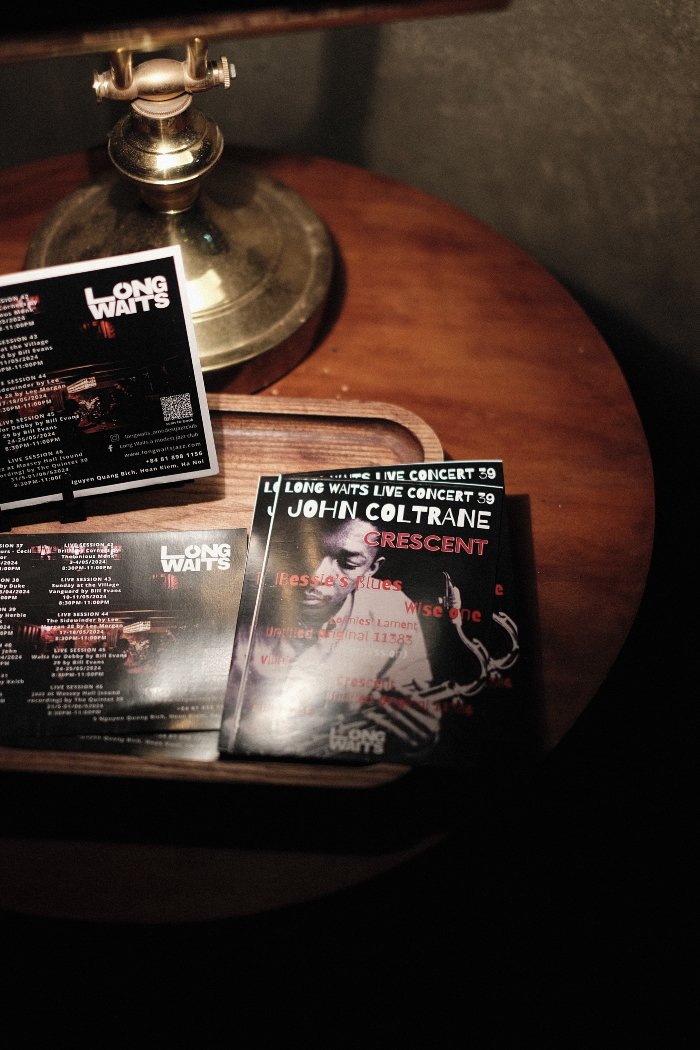
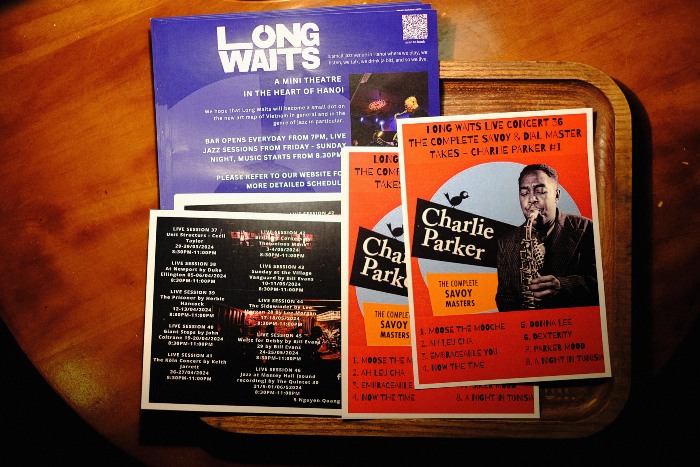
Bảo Long’s journey with Long Waits embodies the transformative power of jazz as a vehicle for cultural exchange, artistic exploration, and personal growth. By sharing the legacy of classic jazz albums and fostering a community of passionate musicians and listeners, he has created a haven where the spirit of jazz thrives—a place where silence gives way to improvisation, anticipation yields to revelation, and the soulful creative spirit of jazz resonate with the heartbeat of Hanoi’s Old Quarter. Through his visionary leadership and unwavering commitment to jazz’s authenticity, Bảo Long is ensuring that the genre continues to inspire and resonate with audiences, today and for generations to come.
At Long Waits, jazz is not for sale.
*Nguyễn Quí Đức (1958-2023) was a Vietnamese American broadcaster, writer, editor, translator, interior designer, and artist. He relocated to Vietnam in 2006. In Hanoi, he founded the Tadioto bar. The bar developed into a well-known gathering spot for journalists, writers, diplomats, artists, musicians and anybody else drawn to the space’s intimate, private ambiance and distinctive aesthetics.














